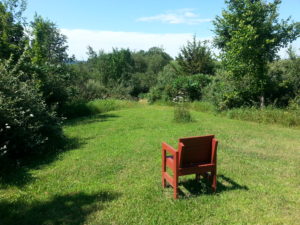The sannyasi (a spiritual Hindu person who has turned away from all material possessions) had reached the outskirts of the village and settled down under a tree for the night when a villager came running up to him and said, “The stone! The stone! Give me the precious stone!”
“What stone?” asked the sannyasi.
“Last night the Lord Shiva appeared to me in a dream,” said the villager, “and told me that if I went to the outskirts of the village at dusk I should find a sannyasi who would give me a precious stone that would make me rich forever.”
The sannyasi rummaged in his bag and pulled out a stone. “He probably meant this one,” he said, as he handed the stone over to the villager. “I found it on the forest path some days ago. You can certainly have it.”
The man gazed at the stone in wonder. It was a diamond; probably the largest diamond in the world, for it was as large as a person’s head.
He took the diamond and walked away. All night he tossed about in bed, unable to sleep. Next day at the crack of dawn he woke the sannyasi and said, “Give me the wealth that makes it possible for you to give this diamond away so easily.”
 If we really think about it, we’re all guilty of worshiping a molten calf. It is so easy to desire more in life as we are bombarded with the sales pitches of our modern society. How often we become stiff-necked people, worshiping something of our own making and not our one, true God. How often we crave for more instead of letting go and living more simply. Isn’t that our Lenten calling? The parable suggests that not being controlled by possessions is a step to spiritual freedom, the kind of freedom that most people say they want. But how do we get there? How can we simplify our lives and respond to the invitation to live with less stuff coming between us and God?
If we really think about it, we’re all guilty of worshiping a molten calf. It is so easy to desire more in life as we are bombarded with the sales pitches of our modern society. How often we become stiff-necked people, worshiping something of our own making and not our one, true God. How often we crave for more instead of letting go and living more simply. Isn’t that our Lenten calling? The parable suggests that not being controlled by possessions is a step to spiritual freedom, the kind of freedom that most people say they want. But how do we get there? How can we simplify our lives and respond to the invitation to live with less stuff coming between us and God?
Let me suggest three not so easy steps from Fr. James Martin’s book, The Jesuit Guide to Almost Everything.
- Get rid of whatever you don’t need. This is the first step of simplifying. Donate your stuff to a church, shelter or donation center. But don’t give away your junky stuff to the poor. Toss that out! The poor deserve decent things, just like we do.
- Distinguish between wants and needs. It’s difficult to resist the desire to have what our friends have and what marketers tell us we need, but turning these things down leads us to freedom. Think of it like a diet. You feel better if you avoid unnecessary calories – and it’s the same if you avoid unnecessary purchases. Go on a buying diet. Ask yourself: is it “nice to have” or “need to have.”
- Get rid of things you think you need, but can actually live without. This goes beyond things you know you don’t need into things you believe you need, but can forego. An example would be giving a treasured possession to a friend who did something for you above and beyond what was expected. This is very difficult to do, but we’re always happier after we’ve walked this path of remembering someone’s great kindness.
What we need to remember during these three steps is that in all these things, to trust that God will help us along this path, because it is a path to freedom – which God desires for us. The greatest step towards a life of simplicity is to learn to let go. This Lent, let us un-stiffen our necks and take our eyes off of our molten calf. May we live simply and get rid of anything that prevents us from following God.
God is always with us, and it doesn’t get any simpler than that.




